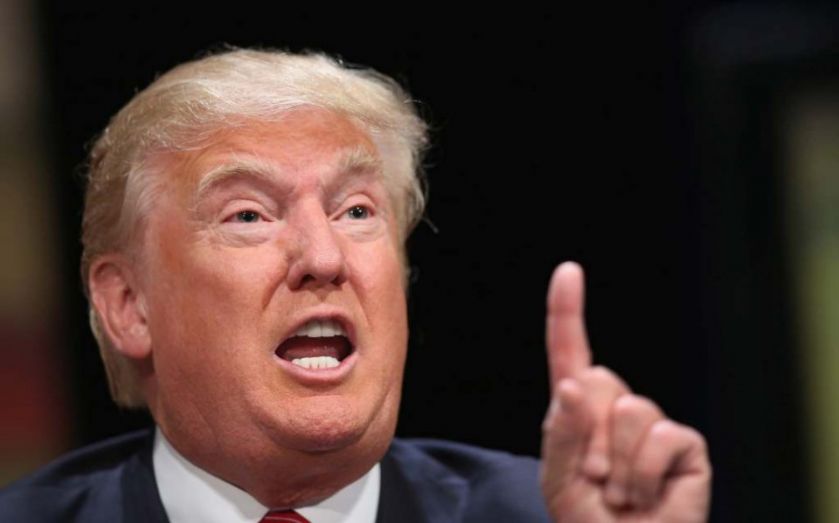Trumpmania: The odious billionaire Donald Trump’s gloom won’t win over an optimistic US

“They are bringing drugs, and bringing crime, and they’re rapists.” – Republican Donald Trump, on Mexican immigrants, at his presidential announcement
“With malice toward none, with charity to all… let us strive to finish the work we are in, to bind up the nation’s wounds.” – Republican Abraham Lincoln, on ending the US Civil War, at his second inaugural address, 1865
The above quotes perfectly sum up my feelings about the present state of America’s Republican Party; how far we have fallen! To paraphrase Rodgers and Hammerstein, how do we solve a problem like The Donald? Donald Trump, odious and blustering billionaire, is well ahead of the pack in the early days of the race for the Republican nomination for the presidency. Not the presidency of the local rotary club – for which I can think of dozens of candidates from my hometown of Rocky River, Ohio who are more qualified than Trump – but of the United States. The once proud party of Lincoln and Reagan has descended to lauding a fact-challenged reality show host. It would be hysterical, if it weren’t so tragic.
Yet on 5 August, just ahead of the first Republican debate, the Real Clear Politics average of polls had Trump at 23 per cent, former Florida governor Jeb Bush well behind at 13 per cent, and Wisconsin governor Scott Walker on 11 per cent. None of the other legion of Republican hopefuls (there are 17 “serious” candidates in all) was above the 10 per cent threshold. For the moment, and despite daily gaffes that would fell mere mortals, it’s all Trump, all the time.
How can this possibly be explained to rational human beings? Just remember that, given America’s rigid first-past-the-post electoral system (much like that of Britain), populist movements, to have any say at all, must work within the cramped confines of the established Democratic and Republican parties. The US does not have a Ukip or Front National on the right, or a Podemos or Syriza on the left.
Trump is a response to the same basic factors that impelled the rise of these European populists: the Lehman crash of 2008, and the global establishment’s collusion in that disaster. When Trump ended the first debate by saying that America now loses all the time, he spoke for rightfully fearful lower middle class Americans, who are well aware the world is passing them by, much as it surely is in Europe. Trump may resemble the middle aged bore with the bad comb-over at every golf clubhouse, ranting about the world, but in his very angry remarks he has struck a nerve with America’s hard working have-nots.
But before everyone needs to abandon reading this column for the comfort of a whisky, Trump has absolutely no chance of winning. The party establishment rightly hates and fears him, seeing Trump as a walking advertisement for Hillary Clinton. He has no organisation behind him to speak of, something desperately necessary to win the nomination of any serious modern American political party. He will be with us for a while, but he will not assume the mantle of Lincoln. American politics is sick, but the illness is not yet terminal.
So who can win? Here are three possibilities; and given the 17-way split, there are others who could still emerge, such as maverick Kentucky senator Rand Paul, New Jersey governor Chris Christie, or Ohio governor John Kasich. But at present the three most likely winners are Bush, Walker, and Florida senator Marco Rubio.
Bush has raised more money than he can count, and has locked down the lion’s share of the best political operatives to run things in the crucial early nominating states of Iowa, New Hampshire, South Carolina, and Nevada. He is the darling of the Republican political establishment, and his poll numbers are competitive in a one-on-one race with Hillary Clinton.
Walker is a genuine conservative who can claim to have prospered in Wisconsin, a Blue State, which is what we American political analysts call Democratic-leaning territory. He took on public sector union power, surviving a recall effort, and won a second term for his principled stand, making him a conservative hero. He appeals to both party regulars and social conservatives; far more than Bush, he can reach all segments of the fractious GOP.
Finally, watch Rubio, who has the highest favourability ratings of any major candidate, a vital number that means more people like him than do not (unlike Hillary, Bush, or even Walker). Youthful, programmatic, yet eloquent, Rubio can electrify crowds by his true personification of the American dream, as he rose from his parent’s immigrant roots to become a US senator, all in a generation. It is a genuinely optimistic story for a country that – despite its flirtation with the gloom of Trump – remains the most optimistic place on the planet.